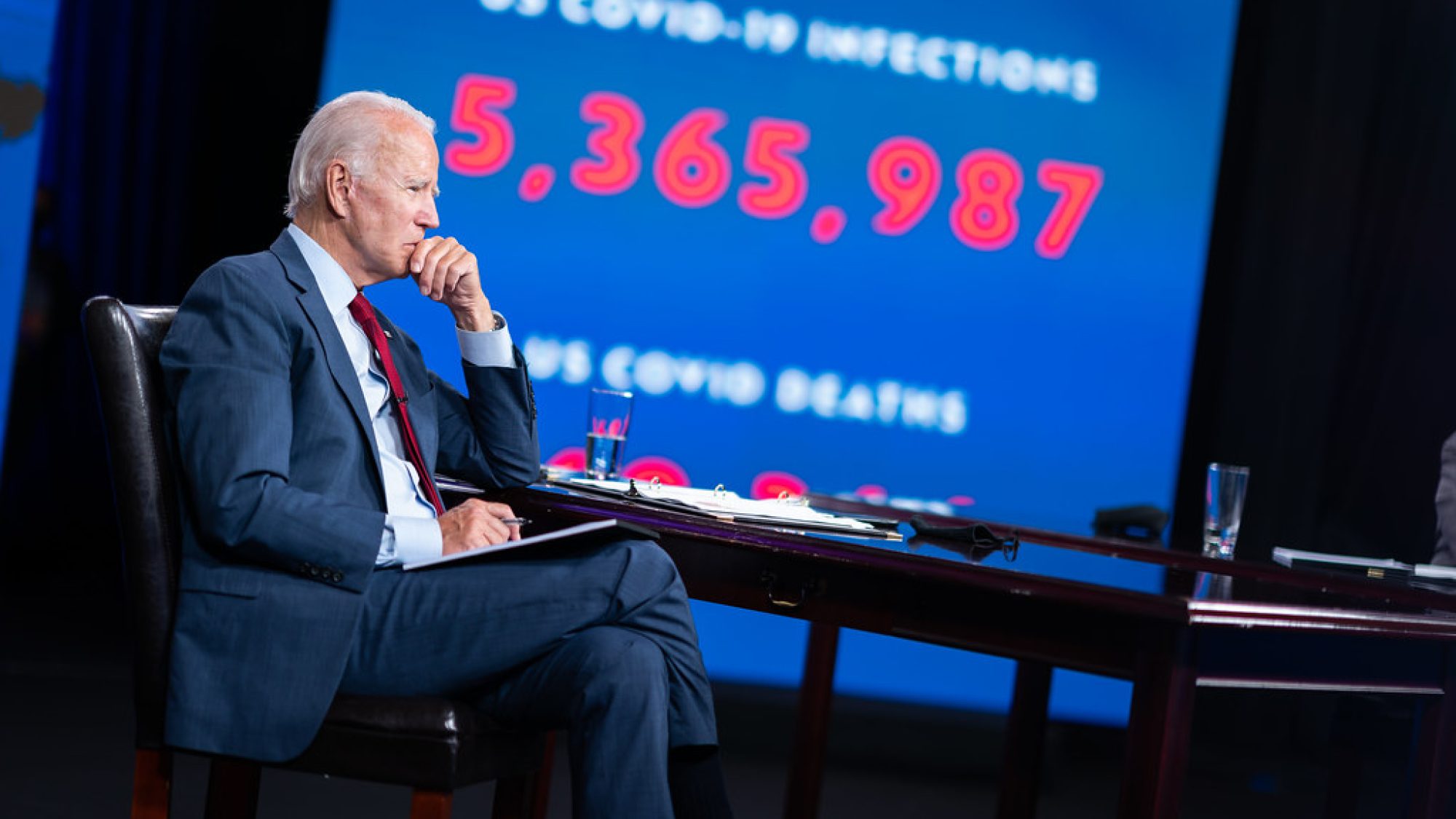
Title: Measurability and Inclusivity: Challenges for the New Global Health Security Fund
The Biden administration has proposed a new funding mechanism for global health security, designed as a multilateral effort to strengthen pandemic preparedness. Answering open questions about country inclusion and developing a rigorous reporting framework will be key to ensuring the new fund’s success.
Why Now? COVID-19 and the Global Health Security Agenda
Almost two years into the global pandemic, more than five million people worldwide have died due to COVID-19-related causes. Despite several remarkable successes—one of the biggest being the rapid development of multiple highly effective vaccines—the public health response has been relentlessly hampered by political missteps, failures of both public and private healthcare delivery, and an ineffectual ability to deliver an equitable and coordinated global response. Public health institutions and governments will grapple with the consequences for years to come, yet one fact is indisputable: the institutions, norms, and policies in place during January 2020 were insufficient to prevent and combat a pandemic. A new financing mechanism from the Biden administration presents a unique opportunity to repair and strengthen these public health institutions.
Multilateral Global Health Security: With Every Plague, A New Initiative
The COVID-19 pandemic is not the first time that the world has grappled with pandemics, nor the first time it has advocated for global health security (GHS) in its response. Each pandemic has been followed by a wave of interest in health “securitization” and—in many cases—the development of a new multilateral institution.
Coming out of a century of devastating infectious disease outbreaks, the World Health Organization (WHO) has maintained a key position in pandemic surveillance and response. Since 1969, member states have been required to report outbreaks of yellow fever, cholera, and plague. In 2005, following the outbreak of SARS-CoV (and frustrations around China regarding delayed and undercounted epidemiological data), International Health Regulations (IHR) were expanded in scope to include anything that could evolve into a “public health emergency of international concern” and serve as a legally binding framework for the handling of international public health events. Today, IHR capacity serves as the reporting backbone for the United Nations’ Sustainable Development Goals (SDGs) indicator on global health security.
Despite this international framework for pandemic preparedness, frustration around the IHR led to the creation of a slew of parallel institutions. In the wake of the 2001 anthrax attacks, a cohort of countries from North America, Europe, and Asia founded the Global Health Security Initiative, which aimed to bring a greater focus to biological and chemical terrorism. As Ebola spread through Western Africa in 2014, and it became clear that less than 20 percent of reporting countries had developed IHR core capacities, the Global Health Security Agenda was founded. It aimed to strengthen evaluations of countries’ pandemic preparedness, such as through the WHO’s joint external evaluation (JEE) tool, and to encourage country commitments to thematic areas like building political will and mobilizing domestic resources. The United States, for instance, conducted its own JEE in 2016 and published a corrective national action plan in 2018. Most recently, the Global Health Security Index was released in 2019, providing a quantitative index of pandemic preparedness to complement the findings from the JEE tool.
Biden and the New FIF for Global Health Security
In September 2021, President Joe Biden added his own proposal to the mix. At a global COVID-19 summit, he called for a strengthened COVID-19 response, GHS, and pandemic preparedness. In this much-anticipated announcement, Biden declared the establishment of a “Global Health Security Financial Intermediary Fund” (hereafter, the GHS Fund) and committed $250 million in seed money to kick off the effort. In the targets set at the summit, the administration pushed for three goals: have at least thirty countries and ten non-governmental organizations join the effort, propose $10 billion in annual funding, and serve as a host for the new project. While funding levels for GHS have historically risen and fallen as new infectious disease threats emerge, a new multilateral funding mechanism solely dedicated to GHS has the potential to fuel significant global change by generating consistent funding, implementing a coordinated multilateral response, and raising GHS’s profile.
While many details of Biden’s new GHS Fund remain unknown, it has been conveyed that it will be a Financial Intermediary Fund (FIF), which is a multilateral financing mechanism idea that stretches back to the 1960s, designed to coordinate the financing of global public goods. FIFs typically pool resources to finance goods, activities, or interventions with costs or benefits that extend beyond country borders, therefore requiring a joint global investment.
At its core, the FIF is a World Bank invention. As of 2014, the World Bank has served as a trustee for more than twenty FIFs that cover programs for health (for example, Global Fund to Fight AIDS, Tuberculosis and Malaria), environmental protection (including the Global Environmental Facility), and education (such as the Global Partnership for Education). Therefore, Biden’s new fund is poised to be a “new” Global Fund, a FIF operating with the World Bank as fiduciary trustee and distributing funds to external agencies to implement GHS work.
Conversation About Country Inclusion and Representation
The proposed GHS Fund clearly acknowledges that GHS cannot be implemented alone and requires consistent multilateral efforts. The impacts of COVID-19 highlight that no one country can respond to a global or regional infectious disease in isolation. Yet, there is no conversation thus far about broader inclusivity in the GHS Fund’s governance body except to note that “at least thirty countries” should sign on. Notably, the recommendation for a GHS Fund emerged from the recommendations of the G20’s High Level Independent Panel on financing the Global Pandemic Preparedness and Response, an international forum with only one African member country.
The GHS Fund should incorporate similar elements to the Global Fund, another FIF providing pandemic relief. The Global Fund is governed by a Board with equal membership from donor countries and implementing countries, as well as voting members from civil society and communities impacted by the diseases.
The role of implementing countries in designing the programs or activities funded through the GHS Fund also requires more attention. For instance, the Global Fund’s Country Coordinating Mechanisms include national committees comprised of government, multilateral organizations, and civil society organizations that request funding and oversee grant implementation.
Biden’s proposal must distance itself from a narrow governance structure because it not only risks losing the expertise of low- and lower-middle income countries (many of which have considerable experience in combating infectious disease), but also perpetuates cynicism about GHS favoring the priorities of high income countries. This flies in the face of the growing movement to decolonize global health. A response led by high income countries is an anachronistic governance approach that is unlikely to achieve its goals and inflames perennial criticism of GHS as prioritizing North American and European interests and goals.
The Need for a Rigorous Reporting Framework
A universally agreed upon definition for GHS is still a matter of debate; the metrics, indicators, and targets are even more murky. The SDG target is opaque as the indicator measured by the United Nations is “International Health Regulations (IHR) capacity and health emergency preparedness,” but a numeric target is lacking. The WHO’s JEE framework under the Global Health Security Agenda was initially developed to bring rigor to evaluations of GHS and articulate the minimum criteria needed to achieve IHR capabilities; however, the JEE measures themselves have been criticized for being neither quantifiable nor objective. Since governments and private institutions are asked to invest into the project, the GHS Fund will be under immense pressure to demonstrate impact.
Historical efforts to measure GHS have been hampered by a reliance on national self-reporting. Both JEEs and reporting on IHR capacity are voluntary, country-led assessments, risking bias from national self-interest and lacking rigorous validation by independent technical partners. While the Global Health Security Index offers a quantitative framework and is measured using publicly-available data, the index performed poorly in predicting the COVID-19 response (the United States and United Kingdom were predicted to be among the best prepared, while countries like New Zealand fell much lower in the list) and is criticized for prioritizing high-income country priorities.
The metrics and indicators that existed pre-COVID-19 are due for a reassessment. COVID-19 highlighted the duel between international cooperation and domestic self-interest as countries delayed notification of outbreaks to WHO, violated international regulations around travel restrictions, and intentionally declined to combat the pandemic. It is therefore incumbent for the GHS Fund to prioritize and report against interventions resilient to the political realities that emerge during health emergencies. The first priorities of the new GHS Fund should be the development of a framework for GHS programming. This framework must clearly acknowledge and complement public health programming, such as the SDGs and Global Fund’s health systems strengthening investments, and prioritize metrics that are quantifiable, objective, measurable, and most importantly, likely to improve pandemic preparedness.
The new fund for GHS presents a key opportunity to ensure a stronger response to future pandemics. However, the success and sustainability of the fund are inextricably tied up in its ability to ensure broad inclusion and deliver measurable outcomes. Imminent decisions about governance and accountability will be crucial in determining the fund’s long-term potential for impact.
. . .
Alana Sharp is a senior associate with the Global Health Policy & Politics Initiative at the O’Neill Institute for National and Global Health Law. In previous roles, she has worked as a public health policy researcher and technical specialist in the Global Fund to Fight AIDS, Tuberculosis and Malaria, amfAR, the University of Michigan, and the U.S. Agency for International Development. Her research has focused on accountability in global health programs, HIV and tuberculosis, domestic opioid use, and novel uses of routinely collected data.
Image Credit: Flickr; Adam Schultz / Biden for President; Creative Commons 2.0 License
Recommended Articles

This article examines the EU’s cyber diplomacy in Moldova’s parliamentary elections from September 28, 2025, which marked a new chapter in the bloc’s cyber diplomacy. Drawing on analysis of Russian…

Export controls on AI components have become central tools in great-power technology competition, though their full potential has yet to be realized. To maintain a competitive position in…

The Trump administration should prioritize biotechnology as a strategic asset for the United States using the military strategy framework of “ends, ways, and means” because biotechnology supports critical national objectives…